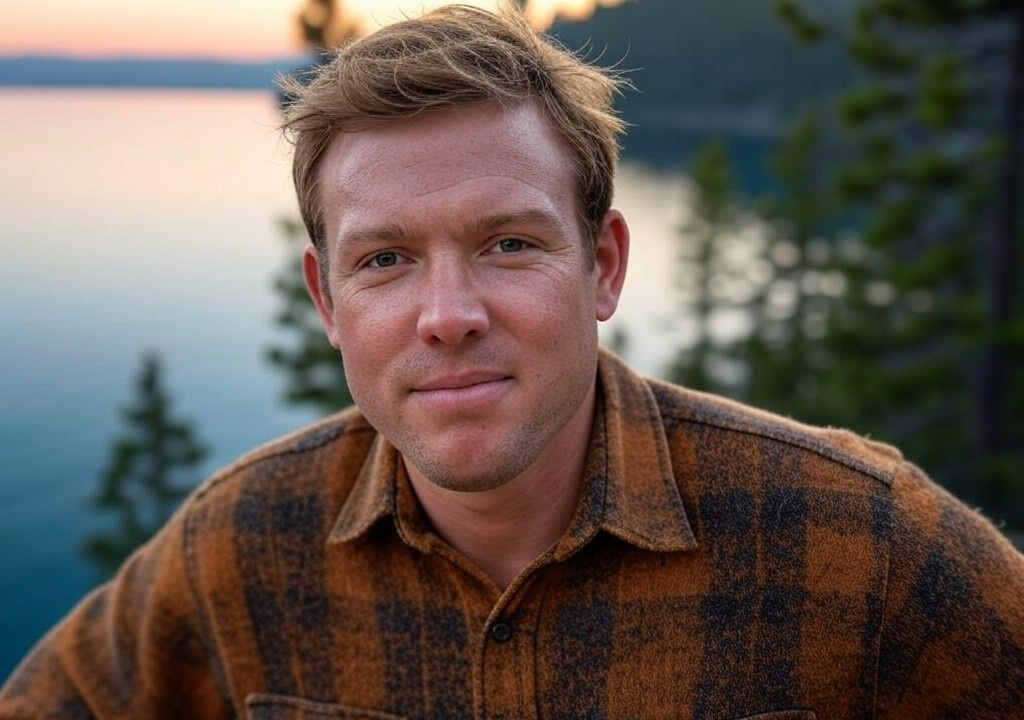There’s a certain irony in growing up surrounded by the vast, unyielding beauty of Lake Tahoe while wrestling with a secret you can’t share with anyone—not even yourself. For years, I was the guy who waxed poetic about the power of nature to heal all wounds, who packed his childhood with tales of hikers finding themselves in the alpine glow or couples rediscovering their love while paddling along the lake’s glassy surface. But beneath that placid exterior? I was drowning in what I’ll call “emotional eco-anxiety.” And yes, I completely made that term up.
Let me explain. Living in Tahoe has a way of shaping you—steering you relentlessly toward one archetype: rugged mountain spirit, emotionally connected to the land, and, in my personal experience, perpetually single. Which was fine—or so I told myself. After all, who needed a partner when you had the Milky Way swirling above you like confetti and the whisper of cedar trees in the night wind? At least, that’s what I said to anyone who asked. The truth was more complex. I was privately waging war with my inability to ask for what I wanted when it came to relationships. And somewhere, deep in my eco-conscious heart, I knew the issue: I was too good at being fine… on my own.
The “Solo Survivalist” Trap
In the great outdoors, independence is key; it’s what keeps you alive in the middle of nowhere when the map proves useless, and the trail markers vanish. It’s the confidence to pack your gear, trek miles into the wilderness, and trust that you’ve got yourself handled. But what works on a twelve-mile backcountry jaunt doesn’t translate so well to love.
I thought independence was my badge of honor. I didn’t need anyone to set up a metaphorical tent in my emotional landscape. I was the champion of solo summit trips, first dates that I let fizzle into “we should totally grab coffee sometime” territory, and “I’m not really looking for anything serious right now” excuses. But somewhere along the way, this self-reliance turned into self-sabotage. No one could get close—not really—because I was subconsciously setting up camp miles from my own vulnerability.
The wake-up call came in the form of a disastrous anniversary dinner with someone I had reluctantly agreed to date. Midway through quinoa-stuffed mushroom appetizers (she was vegan; I, famously, am not), she paused, fork in hand, and said: “I feel like… you keep me at arm’s length.” She wasn’t wrong. With all the grace of a startled black bear, I blurted, “No, I don’t,” followed by a healthy swig of pinot noir. But inside? I knew she was spot on. I was terrified of letting anyone see the parts of me that were messy, insecure, or, dare I admit it—needy.
The “Mountain Man Myth” Crumbles
Here’s the thing about secrets: they grow heavier the longer you carry them alone. And eventually, they spill out. My breakthrough came, unsurprisingly, in the woods.
Picture this. It’s late autumn—leaves crunch underfoot, and the cold bites just enough to remind you winter’s around the corner. I’d gone out alone (again), hiking to clear my mind after the mushrooms-and-pinot debacle. As I reached a ridge overlooking a sunlit valley, the thought hit me like a rogue snowball: “Why can’t I ask for what I want?” Not just in dating—but in life. Why was I so bent on proving I was fine on my own when, really, I wanted someone to hike beside me, to share blister stories with, to laugh with over bear-proof canisters and lukewarm trail coffee?
I realized I had spent years trying to embody the perfect, unflappable mountain man—eerily calm, capable, undemanding. But that guy? He was a myth. Asking for help—or companionship—wasn’t weakness. It was just being human.
Lessons from the Trail: Breaking the Cycle
Figuring out how to rewrite years of internal programming wasn’t all campfire epiphanies and lakeside revelations. It took awkward trial-and-error, a heap of humility, and—unexpectedly—a parallel realization that backpacking holds surprising lessons for relationships. Here’s what I learned:
-
Pack Light but Intentionally
Much like a good hike, a strong relationship thrives on balance. Carry too much emotional baggage—fear of rejection, guardedness, the assumption you’ll mess everything up—and you’ll get winded halfway up the hill. Start small: What matters most to you? Pack that. Leave the rest behind. Which, yes, meant I had to let go of my “I don’t care” attitude and actually start caring. -
Learn to Read the Weather
I used to romanticize the idea that stormy skies—aka drama—were part and parcel of passion. They’re not. Relationships, like hiking trips, benefit from a little preparation and a lot of attention to warning signs. The clearer the intention at the start, the sunnier both experiences tend to be. -
Don’t Fear the Blisters
Let’s face it: hiking can be uncomfortable. So can relationships. Blisters—literal or metaphorical—are a part of it. But here’s the good news: they heal. And those shared challenges? They toughen you up for the longer journey ahead. I had to stop seeing vulnerability as weakness and start seeing it as grit. -
Know When to Turn Back
Not every path ends with a sweeping vista. Some relationships—and trails—just aren’t right. And that’s okay. Learning to recognize when to call it quits is just as important as pushing forward. The challenge is to trust yourself enough to let go when it’s time.
From Branches to Bridges: Walking Toward Connection
Looking back, the battle I fought—my refusal to let anyone in—was really a fear of being seen. In the wilderness, we talk a lot about “leave no trace,” about being invisible so nature can thrive. But in relationships, the opposite is true. You have to leave a trace. You have to show up, flaws and all, and trust that it’s enough.
I never did fix things with the woman from the disastrous mushroom dinner—and that’s okay. What I did do was start cultivating something unfamiliar but necessary: openness. I began asking myself questions like, “What do I actually want in love?” and “What’s keeping me from asking for it?” More importantly, I stopped pretending I had it all figured out. Spoiler: No one does. That’s kind of the point.
Now, when I look at the endless expanse of Tahoe’s shoreline, I don’t just see solitude. I see possibility—the feeling that love, like the wilderness, isn’t something you conquer. It’s something you steward, nurture, and protect. And the most important step? Admitting you might need a little help along the way.
Because here’s the truth: even the most independent mountain spirits need someone to share their compass.




















